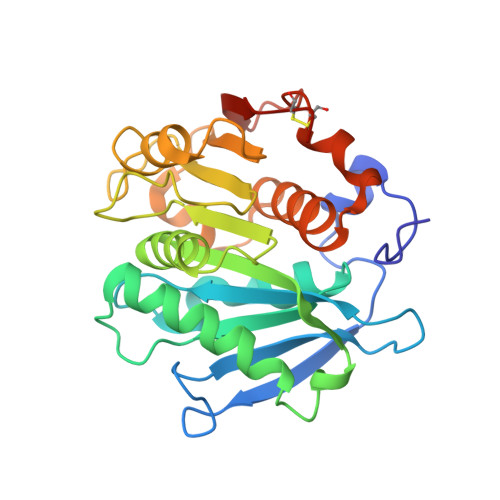Low Carbon Footprint Recycling of Post-Consumer PET Plastic with a Metagenomic Polyester Hydrolase.
Sonnendecker, C., Oeser, J., Richter, P.K., Hille, P., Zhao, Z., Fischer, C., Lippold, H., Blazquez-Sanchez, P., Engelberger, F., Ramirez-Sarmiento, C.A., Oeser, T., Lihanova, Y., Frank, R., Jahnke, H.G., Billig, S., Abel, B., Strater, N., Matysik, J., Zimmermann, W.(2022) ChemSusChem 15: e202101062-e202101062
- PubMed: 34129279
- DOI: https://doi.org/10.1002/cssc.202101062
- Primary Citation of Related Structures:
7NEI - PubMed Abstract:
Earth is flooded with plastics and the need for sustainable recycling strategies for polymers has become increasingly urgent. Enzyme-based hydrolysis of post-consumer plastic is an emerging strategy for closed-loop recycling of polyethylene terephthalate (PET). The polyester hydrolase PHL7, isolated from a compost metagenome, completely hydrolyzes amorphous PET films, releasing 91?mg of terephthalic acid per hour and mg of enzyme. Vertical scanning interferometry shows degradation rates of the PET film of 6.8?¦Ìm?h -1 . Structural analysis indicates the importance of leucine at position 210 for the extraordinarily high PET-hydrolyzing activity of PHL7. Within 24?h, 0.6?mg enzyme ?g PET -1 completely degrades post-consumer thermoform PET packaging in an aqueous buffer at 70?¡ãC without any energy-intensive pretreatments. Terephthalic acid recovered from the enzymatic hydrolysate is then used to synthesize virgin PET, demonstrating the potential of polyester hydrolases as catalysts in sustainable PET recycling processes with a low carbon footprint.
Organizational Affiliation:
Institute of Analytical Chemistry, Leipzig University, 04103, Leipzig, Germany.















